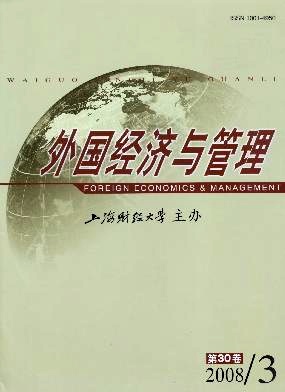试析行为合约激励理论研究的起源、发展与实践意蕴
外国经济与管理 2008 年 第 30 卷第 03 期, 页码:1 - 8
摘要
参考文献
摘要
近年来,行为合约激励理论力争突破现有经济学激励理论研究的迷思,开始尝试将影响信念、偏好和行为的社会心理因素引入到代理双方的行为博弈分析之中,力图搭建一个能够解释激励行为异质性的合约框架。本文对行为合约激励理论研究的起源、主要发展及其实践意蕴进行了系统梳理,进而对行为合约激励理论的未来发展进行了简要展望。
[1]Gibbons,Roberts.Incentives in organizations[J].Journal of Economic Perspectives,1998,12(4):115-132.
[2]Fehr,Ernst,and Armin Falk.Psychological foundations of incentives[J].European Economic Review,2002,46:687-724.
[3]Pesendorfer,Wolfgang.Behavioral economics comes of age:Areview essay on advances in behavioral economics[J].Journal of Eco-nomic Literature,2006,17:712-721.
[4]Akerlof,George,and Rachel E Kranton.Identity and the economics of organizations[J].Journal of Economic Perspectives,2005,19(1):9-32.
[5]Benabou,Roland,and Jean Tirole.Incentives and prosocial behavior[J].American Economic Review,2006,18:1 652-1 678.
[6]Fehr,Ernst,and Si mon Gachter.Fairness and retaliation:The economics of reciprocity[J].Journal of Economic Perspectives,2000,14(3):159-181.
[7]Oxoby,Robert J.Status characteristics,cognitive bias,andincentives in teams[J].Journal of Socio-Economics,2002,31:301-316.
[8]O’Donkghue,Ted,and Matthew Rabin.Incentives and procrastinations[J].Quarterly Journal of Economics,1999,20:796-818.
[9]Kahneman,Daniel,and Amos Tversky.Prospect theory:An analysis of decision under risk[J].Econometrica,1979,47(2):263-292.
[10]Elster,Jon.Emotions and economic theory[J].Journal of Economic Literature,1998,36:47-74.
[11]Fehr,Ernst,Alexander Klein,and Klaus MSchmidt.Fairness and contract design[J].Econometrica,2007,75(1):121-154.
[12]Grund,Christian,and Dirk Sci wka.Envy and compassionin tournaments[J].Journal of Economics and Management Strategy,2005,14(1):187-207.
[13]Bandiera,Oriana,Iwan Barankay,and I mran Rasul.Social preference and the response to incentives:Evidence from personnel data[J].Quarterly Journal of Economics,2005,25:917-962.
[14]Encinosa III,William E,Martin Gaynor,and James B Rebitzer.The sociology of groups and the economics of incentives:Theory andevidence on compensation systems[J].Journal of Economic Behavior and Organization,2007,62:187-214.
[15]Chong,Vincent K,and Ian R C Eggleton.The i mpact of reliance on incentive-based compensation schemes,information asymmetryand organizational commit ment on managerial performance[J].Management Accounting Research,2007,18:312-342.
[16]Baker,George,Jensen,Michael,and Murphy,Kevin J.Compensation and incentives:Practice versus theory[J].Journal of Finance,1988,43:593-616.
[17]Camerer,Colin,Linda Babcock,George Loewenstein,and Richard Thaler.Labor supply of New York city cabdrivers:One day at ati me[J].Quarterly Journal of Economics,1997,112(2):407-441.
[18]Intter,Christopher C,David F Larker,and Marshall W Meyer.Subjectivity andthe weighting of performance measures:Evidence froma balanced scorecard[J].The Accounting Review,2002,78(3):725-758.
[19]Benabou,Roland,and Jean Tirole.Intrinsic and extrinsic motivation[J].Reviewof Economic Studies,2003,70:489-520.
[20]Fehr,Ernst,and Michael Kosffld.The hidden cost of control[J].American Economic Review,2006,20:1 611-1 630.
[21]Gneezy,Uri,and Aldo Rustichini.Pay enough or don’t pay at all[J].Quarterly Journal of Economics,2000,32:791-811.
[2]Fehr,Ernst,and Armin Falk.Psychological foundations of incentives[J].European Economic Review,2002,46:687-724.
[3]Pesendorfer,Wolfgang.Behavioral economics comes of age:Areview essay on advances in behavioral economics[J].Journal of Eco-nomic Literature,2006,17:712-721.
[4]Akerlof,George,and Rachel E Kranton.Identity and the economics of organizations[J].Journal of Economic Perspectives,2005,19(1):9-32.
[5]Benabou,Roland,and Jean Tirole.Incentives and prosocial behavior[J].American Economic Review,2006,18:1 652-1 678.
[6]Fehr,Ernst,and Si mon Gachter.Fairness and retaliation:The economics of reciprocity[J].Journal of Economic Perspectives,2000,14(3):159-181.
[7]Oxoby,Robert J.Status characteristics,cognitive bias,andincentives in teams[J].Journal of Socio-Economics,2002,31:301-316.
[8]O’Donkghue,Ted,and Matthew Rabin.Incentives and procrastinations[J].Quarterly Journal of Economics,1999,20:796-818.
[9]Kahneman,Daniel,and Amos Tversky.Prospect theory:An analysis of decision under risk[J].Econometrica,1979,47(2):263-292.
[10]Elster,Jon.Emotions and economic theory[J].Journal of Economic Literature,1998,36:47-74.
[11]Fehr,Ernst,Alexander Klein,and Klaus MSchmidt.Fairness and contract design[J].Econometrica,2007,75(1):121-154.
[12]Grund,Christian,and Dirk Sci wka.Envy and compassionin tournaments[J].Journal of Economics and Management Strategy,2005,14(1):187-207.
[13]Bandiera,Oriana,Iwan Barankay,and I mran Rasul.Social preference and the response to incentives:Evidence from personnel data[J].Quarterly Journal of Economics,2005,25:917-962.
[14]Encinosa III,William E,Martin Gaynor,and James B Rebitzer.The sociology of groups and the economics of incentives:Theory andevidence on compensation systems[J].Journal of Economic Behavior and Organization,2007,62:187-214.
[15]Chong,Vincent K,and Ian R C Eggleton.The i mpact of reliance on incentive-based compensation schemes,information asymmetryand organizational commit ment on managerial performance[J].Management Accounting Research,2007,18:312-342.
[16]Baker,George,Jensen,Michael,and Murphy,Kevin J.Compensation and incentives:Practice versus theory[J].Journal of Finance,1988,43:593-616.
[17]Camerer,Colin,Linda Babcock,George Loewenstein,and Richard Thaler.Labor supply of New York city cabdrivers:One day at ati me[J].Quarterly Journal of Economics,1997,112(2):407-441.
[18]Intter,Christopher C,David F Larker,and Marshall W Meyer.Subjectivity andthe weighting of performance measures:Evidence froma balanced scorecard[J].The Accounting Review,2002,78(3):725-758.
[19]Benabou,Roland,and Jean Tirole.Intrinsic and extrinsic motivation[J].Reviewof Economic Studies,2003,70:489-520.
[20]Fehr,Ernst,and Michael Kosffld.The hidden cost of control[J].American Economic Review,2006,20:1 611-1 630.
[21]Gneezy,Uri,and Aldo Rustichini.Pay enough or don’t pay at all[J].Quarterly Journal of Economics,2000,32:791-811.
引用本文
黄再胜. 试析行为合约激励理论研究的起源、发展与实践意蕴[J]. 外国经济与管理, 2008, 30(3): 1–8.
导出参考文献,格式为:
上一篇:国外裁员幸存者综合征研究综述





 6652
6652  711
711

